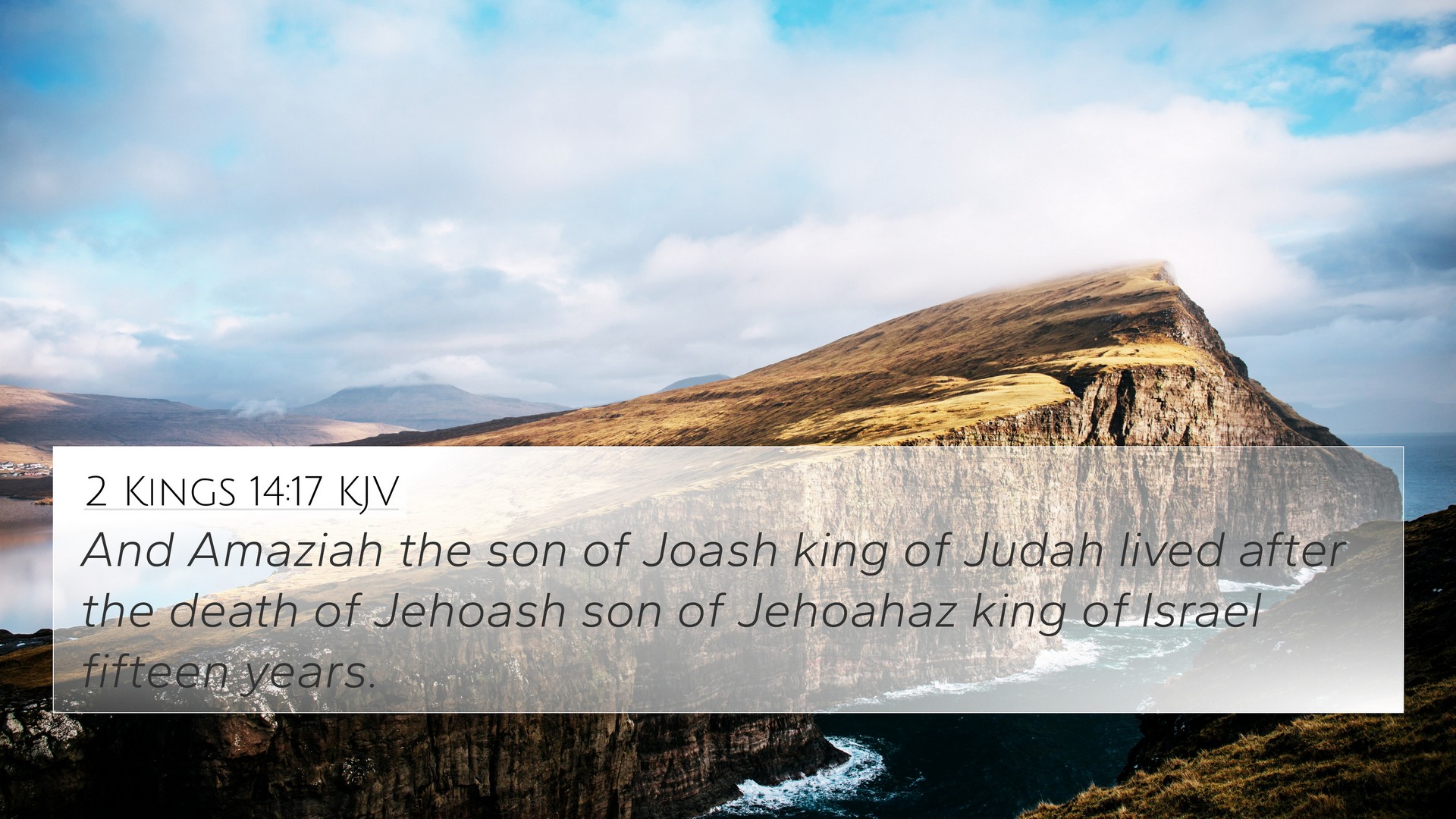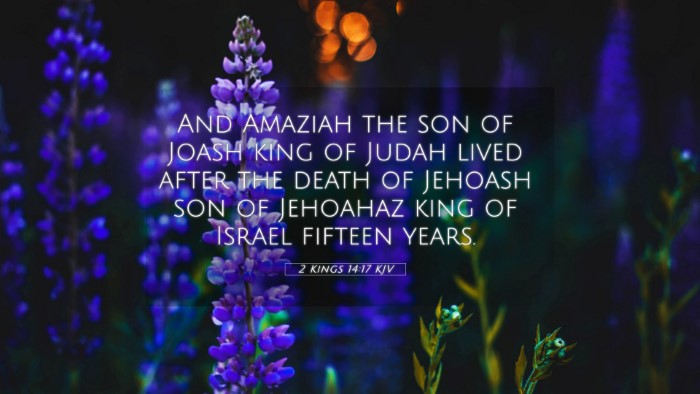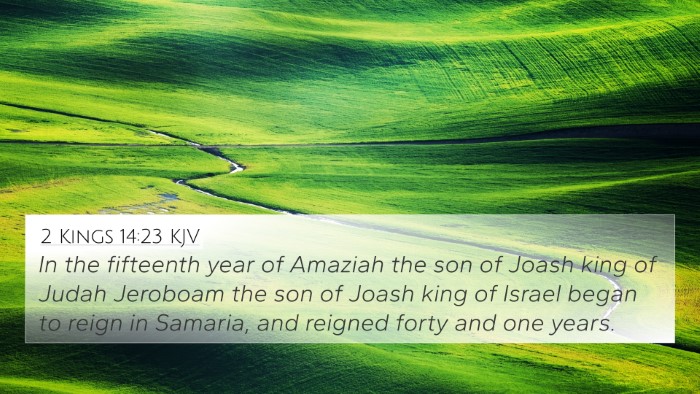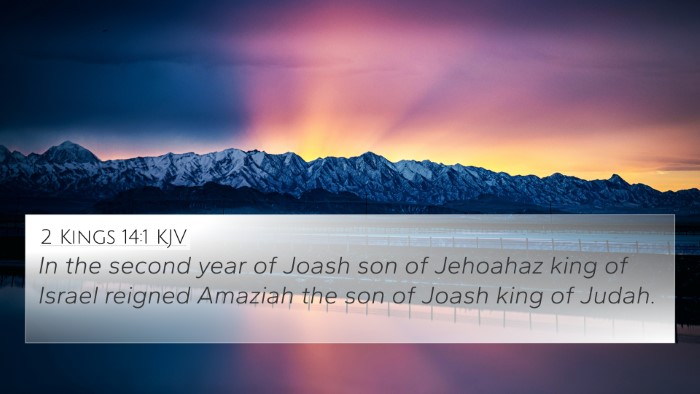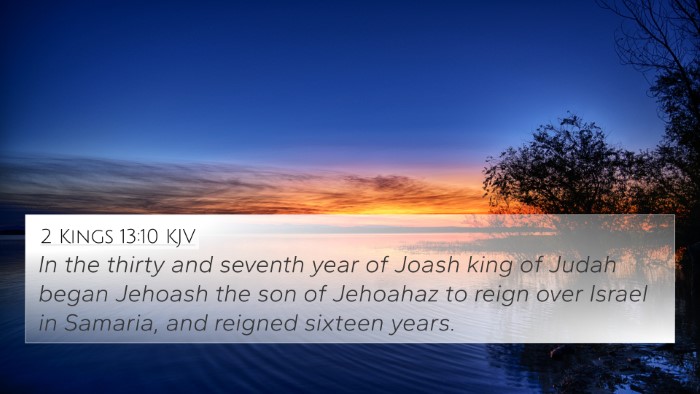Understanding 2 Kings 14:17
2 Kings 14:17: "And Amaziah the son of Joash king of Judah lived after the death of Jehoash son of Jehoahaz king of Israel fifteen years."
This verse marks a historical moment in the timeline of the kings of Judah and Israel. It highlights the period after King Jehoash's death in Israel, showing the continuation of Amaziah's reign in Judah.
Commentary Insights
- Matthew Henry: Henry emphasizes the significance of chronology in the biblical narrative, noting that the reigns of kings were often intertwined and their legacies impacted both their own kingdoms and neighboring ones. He reflects on how Amaziah’s reign came with challenges, particularly against Israel.
- Albert Barnes: Barnes provides a detailed look at Amaziah, describing his character and the consequences of his actions during his reign. He draws connections to earlier events, outlining the complexities in the leadership of Israel and Judah during this period.
- Adam Clarke: Clarke elaborates on the political and spiritual state of the kingdoms at that time, shedding light on the importance of leadership after Jehoash's rule and how Amaziah's decisions influenced Judah's trajectory.
Historical Context
The context surrounding 2 Kings 14:17 is essential for understanding the dynamics of ancient Israelite kingdoms. Amaziah became king of Judah after a turbulent period marked by idol worship and conflicts among the people of both kingdoms. His rule is noted for attempts to restore rightful worship and engage in military actions against Israel.
Cross-References for Deeper Insight
- 2 Kings 12:21: Discusses the lineage and reign of Jehoash (Joash) king of Judah.
- 2 Kings 13:10: Highlights the reign of Jehoash king of Israel, giving a background of his leadership.
- 2 Chronicles 25:1-2: Offers additional details on Amaziah’s accomplishments and failures during his reign.
- 2 Chronicles 24:15: Refers to the death of Jehoash and subsequent events in Judah.
- Micah 1:1: Provides prophetic context during Amaziah's reign and mentions Jerusalem.
- Amos 1:1: Gives prophetic references during the ministries aligned with the kings of Israel and Judah.
- Isaiah 1:1: Further contextualizes the prophetic voices during this historical timeframe.
Thematic Connections
This verse is not just a historical note, but it offers rich thematic connections to royal lineage, divine justice, and the unfolding of God’s plan through the kings of Israel and Judah. The key themes that emerge include:
- Divine Sovereignty: God’s control over history and the unfolding of events that fit His purpose.
- Leadership and its Consequences: The influence of a king's decisions on both the spiritual and physical welfare of the kingdom.
- Inter-kingdom Relations: The dynamics between Judah and Israel, marked by both conflict and shared heritage.
Lessons and Applications
Through the lens of 2 Kings 14:17, modern readers can reflect on the importance of righteous leadership and its impact on a community's faith and actions. Amaziah's reign presents both challenges and moments where faithfulness can lead to restoration.
Conclusion
Understanding 2 Kings 14:17 in the context of biblical commentary enriches our comprehension of the text and its application today. By cross-referencing with other scripture, we gain insights into the intricate web of biblical history, emphasizing the importance of leadership and divine direction in human affairs.
Related Resources for Further Study
- Books on biblical history and commentaries.
- Bible concordance for exploring scripture connections.
- Cross-reference guides for deeper biblical studies.
